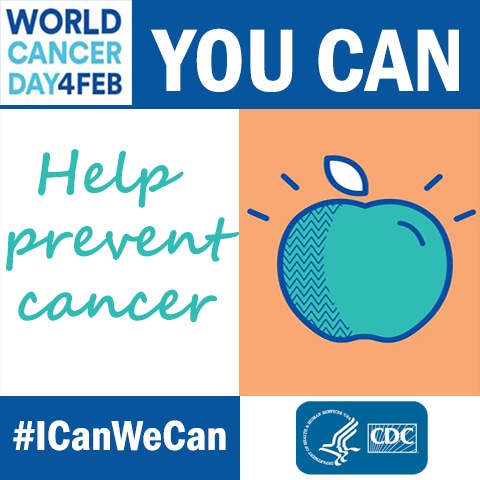

7 Things YOU Can Do to Prevent Cancer
Almost everyone knows someone whose life has been affected by cancer. It’s the second most common cause of death in the United States. The good news is each of us can do something to lower our risk.
- Quit for good. You’ve heard that cigarette smoking causes lung cancer—80% to 90% of lung cancers, in fact. You may not know that tobacco use of any kind is linked to higher risk for cancer in many places in the body. If you use tobacco, quitting now can lower your risk for cancer!
- Be seen and get screened. There are tests that can find cancer early, and some can even prevent cancer. Our cancer screening “cheat sheets” for men and women give a quick overview. Ask your doctor what tests you need at your next yearly checkup.
- Vaccines for tweens. Boys and girls aged 11 to 12 years should get the human papillomavirus (HPV) vaccine. HPV is a virus that can cause cell changes in the body, which may eventually become cancer. The vaccine protects against many of these types of HPV, which can turn into cervical and other cancers if not caught and treated.
- Scale it down. Overweight and obesity in adults is linked to at least 13 different types of cancer, and may be a factor causing people in this country to get cancer at younger ages. A healthy diet and regular physical activity aren’t just about numbers on a scale, they can help lower your risk for a deadly disease.
- Look in your genes. Your family’s health and cancer history can affect you now and in the future. For example, some women with strong family histories of breast or ovarian cancer (especially if these cancers happened in relatively young people) have changes in the BRCA1 and BRCA2 genes, which are passed down through families. If you have these changes, you may have a higher risk of getting breast and ovarian cancer—and getting it at a younger age than other people. Talking with your loved ones about cancer and your doctor can help you protect your health.
- Love your liver. People who were born between 1940 and 1960 are more likely than others to carry the hepatitis B or hepatitis C viruses. These may not cause any symptoms you would notice, but they are a big risk for liver cancer. There is a hepatitis B vaccine usually given to newborn babies, but adults can get it as well. Remember to protect your liver from damage by drinking alcohol in moderation, too!
- Be gutsy. Or care for your colon, to be exact. Of cancers affecting both men and women, colorectal (colon) cancer is second only to lung cancer in causing death from cancer. It is possible to prevent this cancer by beginning to get screened at age 50. Colorectal cancer screening can catch growths called polyps in your large intestine, so they can be removed before they turn into cancer.





















.jpg)












No hay comentarios:
Publicar un comentario